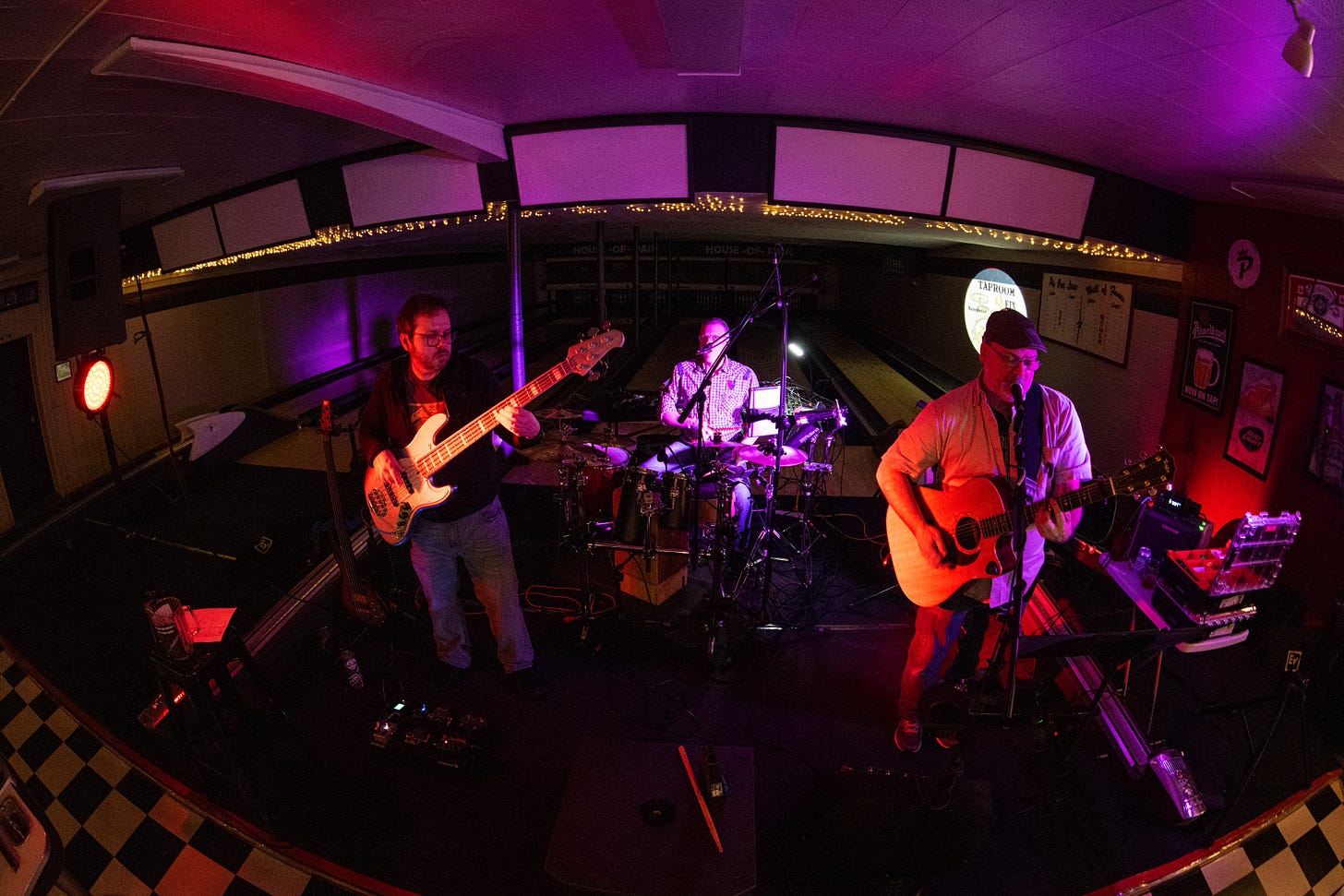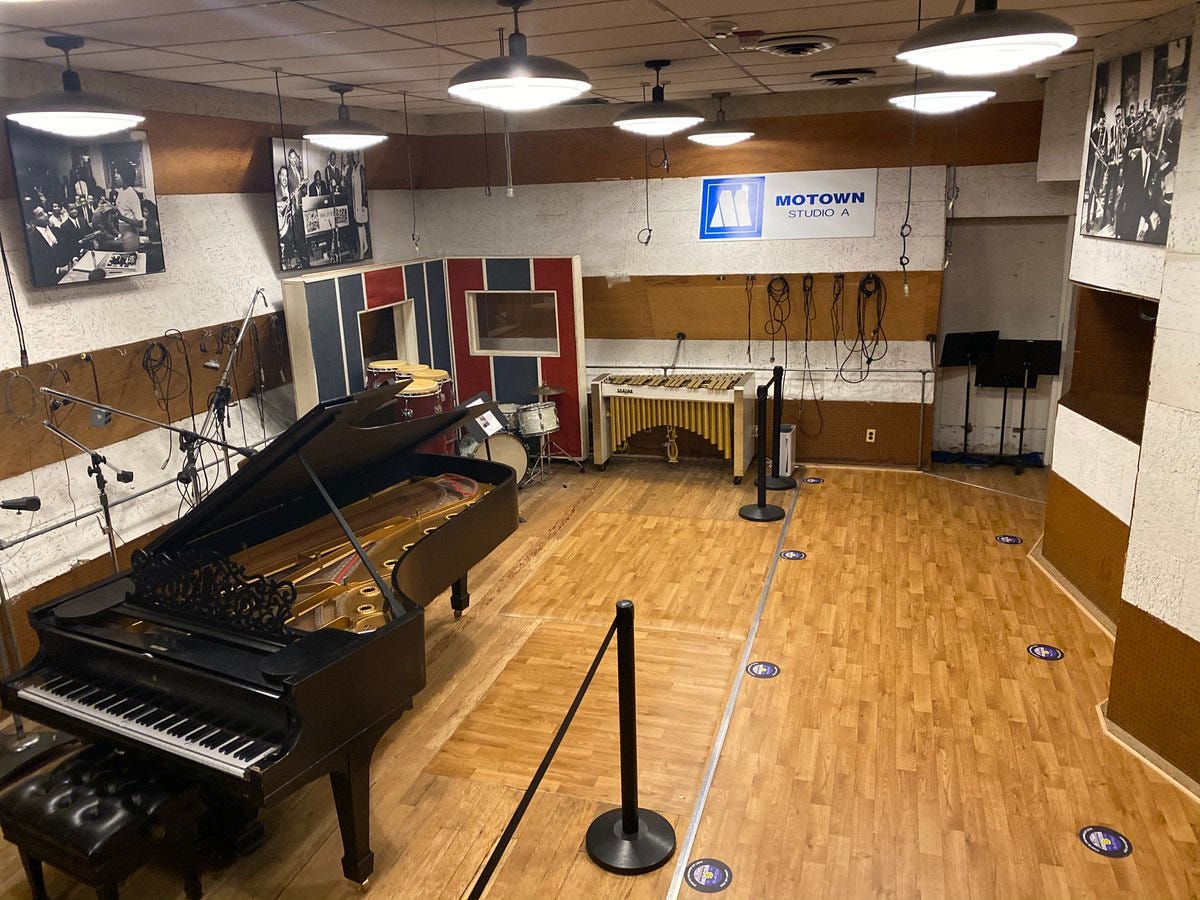What music has taught me about grading
Lessons learned from being the "sage on the stage"
Teaching mathematics at the college level has been my career and vocation for 27 years. I've built my entire adult life around it, and my beliefs about higher education in general run strong and deep. But despite this, you might be surprised to know that teaching is not my biggest passion. That designation goes to something else: Playing live music1.
Music has been part of my DNA my whole life. I grew up in middle Tennessee, in the orbit of Nashville and the country music industry. I became a musician in junior high school, playing trumpet in the band. In college, I switched to singing in concert choir and was recruited to play double bass (an instrument I'd never touched before) in the orchestra. That experience led to the electric bass guitar, an instrument that I've played for over 30 years now. I play in two cover bands (with two more spinning up as we speak) and perform 30-40 times a year in area venues, plus monthly jam sessions at the local brewpub and occasional fill-ins and collaborations with other musicians.
I cannot imagine my life without playing music, and I've recently noticed how much my experience as a musician has influenced, and supports, my practice of grading. When I explain to my discrete math students or a roomful of faculty in a workshop why I use specifications grading, for example, the first explanations that come to mind are analogies to music practice and performance. These two worlds I inhabit are not separate, and today I wanted to share what I think are some of the biggest lessons music has taught me about grading.
Lesson 1: The purpose of grading is growth
I have a reputation among my bandmates for taking notes. I bring a little notepad and a pen with me to gigs and rehearsals as part of my gear and keep them next to me. If we're playing in a bar, in between sets while everyone else is getting a beer, I'm frantically scribbling notes from the previous set: This song landed with the audience, but this one was a dud; we should stop after the third song to introduce the band; I couldn't hear myself during the guitar solo; why does our rhythm guitarist use 13 different effects pedals??!; the intro to the final piece in the set was really nice. Good, bad, ugly -- it all gets noted. At rehearsals following gigs, the rest of the band looks at me and asks, “Well, Robert, what’s in the notes this time?” And then it’s feedback time, no punches pulled.
I do the same for myself when I practice at home. I usually practice 1-2 hours a day, and I keep a journal where I write down what I did and how it went. Sometimes I augment it by recording myself, which is the worst, because it gives the absolute truth about how I sound: you think you played something awesomely, but then the tape says otherwise. But I do it anyway, and I keep listening even if I feel terrible about what I’m hearing.
Why do I do this? Why do I evaluate so carefully and give feedback so mercilessly? It's easy: I want the music to be as good as possible. And this isn't going to happen if I simply play mindlessly and not look for ways to get better. If I could find a way to provide myself and my bandmates with this kind of feedback, without taking notes or listening to the tape, then believe me, I would. But until then, the only way to really improve is to get feedback on what you do, and the purpose of the feedback is to improve.
It's an easy translation to grading student work. A grading system is only as good as its ability to incite growth. I think this is why, 10 years ago, I left traditional grading behind forever. It wasn’t for any high-minded reason; I simply came to realize that traditional grading was doing absolutely nothing to incite intellectual growth in my students, in fact it was inhibiting that growth. So it had to go, end of story. In fact, a truly functional grading system shouldn’t even really be called a “grading system”, but something like a “feedback loop engagement system”. If it’s really working, it’s like my notepad that lives on my amplifier during a gig — it provides real information to a person, who then can use and wants to use the information to make improvements that eventually make the music better.
Lesson 2: Mistakes are data
I had an interesting experience at a recent gig: One of my students showed up. And not just any student, but one with whom I'd had a conversation a few weeks ago about mistakes. I had told the class that I'm sometimes mistake-prone when it comes to simple stuff like doing arithmetic or entering grades into a spreadsheet, so please let me know if I mess something like that up. This student found that strange, and asked how it was possible that a person with a Ph.D. who had been teaching for 27 years could still make mistakes. I said: Mistakes are my middle name, just come to one of my shows some time and you'll see.
So the student came, and sure enough I made plenty of mistakes, even though I've been with this band for two years now and have played our set list dozens if not hundreds of times. We talked about it a little between sets. I asked him if he noticed any mistakes, and he said no. I said, that's not because I didn't make any -- because I did. It's because I've learned that mistakes are just data, so I’ve learned to keep my cool and keep the song moving.
When I mess something up in a performance, we don't stop everything and start over again, and keep repeating this until there are no more mistakes. Even in more formal music environments, like when I played in an orchestra, we didn’t do this. Who would want to go to a concert or show where the music comes to halt whenever there’s a mistake? Instead, the top performers out there -- in music, sports, whatever -- aren't the ones who completely avoid mistakes. They are the ones who know how to respond when they do make a mistake. Miles Davis put it this way:
So it’s not about mistake avoidance. Obviously we want to play music, do math, write essays, or whatever as well as we can, and in all those areas express ourselves as clearly and faithfully to our own visions as possible. Mistakes can get in the way of that expression; but they are also inevitable. So while there is value in avoiding mistakes, there is greater value in building the ability to recover from them, and especially to learn from them.
Lesson 3: Perfection is not the standard
In 40 years of doing live performances, I can’t recall a single time I played something perfectly for longer than 30 seconds. And yet, only very rarely has this gotten in the way of the audience enjoying the music2. The audiences at the gigs I play are not there to hear some flawless, wax-figure rendering of their favorite classic rock tunes. They’re there to have a pizza, or to connect with friends after a long work week, or because they follow the band and have a connection with us. No matter how discerning a listener you might be, the music that affects us the most is not the stuff that has the fewest mistakes in it.
If you don’t believe me, just listen to some early Motown music. In the 1960’s, Motown's records were recorded in the basement of an old house in Detroit that had been converted into a studio. Multitrack recording technology was new and expensive, so most of those records were recorded live -- sometimes an entire orchestra, plus a band and singers, crammed into the basement (shown below).
If you listen carefully to some of the older Motown songs, you’ll notice that they are riddled with mistakes. The physical setup of the recording space caused a lot of problems with the musical performances. For example, the ventilation system in the house was poor, so once the recording started, the room would get incredibly hot, throwing the instruments and vocals out of tune3. It was too expensive and complicated to go back and re-record the entire track just to correct a handful of mistakes, so the producers just kept them.
And yet, if you love Motown music, as I do, you wouldn't have it any other way. It's the organic, warm humanity of those songs that make them so iconic and appealing. If I wanted to listen to mistake-free music, I’d ask a computer to make it and play it back. But if I want to feel something, I’m almost always more likely to put on Marvin Gaye, Stevie Wonder, The Supremes. Some of those songs may have gotten a few notes or production items wrong, but they get the music right.
A lot of times, my students get the idea that because I don’t assign partial credit to work, that I am expecting perfection from them. Nothing could be further from the truth. Nobody necessarily wants to make mistakes, but perfection is not our standard. Perfection is not realistic or sustainable, and often it's not even appealing. Instead, with grading, we are trying to help student "make better music" -- focusing on the big picture, the stuff that lasts well after the "show" is over.
To learn more and see/hear some samples, visit my page at https://www.bandmix.com/rtbass/.
One memorable counterexample: Performing Handel’s Messiah in a mass choir, and one of the pieces roughly halfway through was such a train wreck from the beginning that the conductor stopped and restarted the piece. That’s the only time in my musical career that has ever been done in a concert. We spent the entire rest of the oratorio trying to make up for it, but all that people from the audience could do afterwards was give qualified compliments like “That went really well, all things considered.”
For example, the painfully out of tune horn parts in Marvin Gaye’s otherwise untouchable “Heard it Through The Grapevine” starting around the 2 minute mark.





